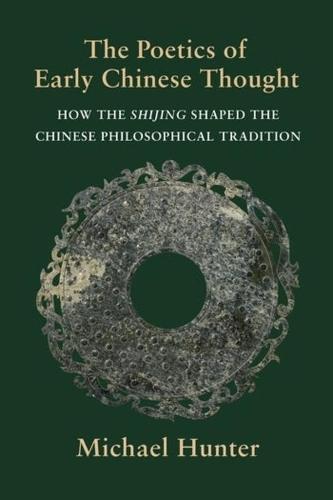Overview
"The modern imagination of classical Chinese thought has long been dominated by Confucius, Mozi, Mencius, and other so-called ""Masters"" of the Warring States period. Michael Hunter argues that this approach neglects the far more central role of poetry, and the Shijing (Classic of Poetry) in particular, in the formation of the philosophical tradition. Through a new reading of its ideology and poetics, Hunter reestablishes the Shijing as a work of major intellectual-historical significance. The Poetics of Early Chinese Thought demonstrates how Shi poetry weaves a vision of society united at every level by the innate and universal impulse to come home. The Shi immersed early thinkers in a world of movement and flow in order to teach them that the most powerful current of all was the gravitational pull of a virtuous king, without whom people can never truly feel at home. Hunter traces the profound influence of the Shi ideology across numerous sources of classical Chinese thought, which he recasts as a network centered on the Shi. Reframing the tradition in this way reveals how poetry shaped ancient Chinese thinkers' conception of the world and their place within it. This book offers both a sweeping critique of how classical Chinese thought is commonly understood and a powerful new way of studying it."
Full Product Details
Author: Michael Hunter
Publisher: Columbia University Press
Imprint: Columbia University Press
ISBN: 9780231201223
ISBN 10: 0231201222
Pages: 240
Publication Date: 13 July 2021
Audience:
Professional and scholarly
,
Professional & Vocational
Format: Hardback
Publisher's Status: Active
Availability: Manufactured on demand

We will order this item for you from a manufactured on demand supplier.
Reviews
An outstanding book focused on reconstructing the worldview of the Shijing and the role that worldview played in the development of early Chinese philosophy. This is a tremendously exciting work that will force a rethinking of many assumptions in the field concerning how we understand early Chinese thought. -- Michael Puett, coeditor of <i>The Huainanzi and Textual Production in Early China</i> This is a remarkably constructive book. Building upon the achievements of recent revisionist scholarship regarding the Shi and armed with the tools of the digital humanities, Hunter restores the Shi to its rightful place at the center of early Chinese thought as the text to which all other texts return. -- Griet Vankeerberghen, coeditor of <i>Chang'an 26 BCE: An Augustan Age in China</i> Hunter presents a radically different perspective on early Chinese literature, putting the Shi center stage and reading all other traditions through that genre. This shift is likely to generate lively debate in the entire field of early China studies and has the potential to open up new avenues of research. -- Matthias Richter, author of <i>The Embodied Text: Establishing Textual Identity in Early Chinese Manuscripts</i> This is an extremely refreshing and inspiring placement of the Odes at the center of thought from the Warring States into the early Chinese imperial period. Hunter convincingly shows how the notion of coming home pervades the Shi and, through them, a wide array of other texts. By doing this, he also reconsiders the dominance of all too familiar boundaries and academic disciplines. -- Carine Defoort, coeditor of <i> The Legitimacy of Chinese Philosophy</i> Reestablishing the Shijing as a text of major philosophical significance, The Poetics of Early Chinese Thought will not only incite vehement debates among scholars working on early Chinese thought, but also has the potential to open up new avenues of research in the entire field of early Chinese studies. -- Lisa Chu Shen * China Review * The exemplary clarity and convincing argumentation of [this] book contribute to a new way to study Chinese intellectual history, avoiding the myopic over-emphasizing of ‘Masters’ texts, and acknowledging the essentially important anonymous compositions amongst which the Shi are of paramount importance. -- Yegor Grebnev * Monumenta Serica *
Hunter presents a radically different perspective on early Chinese literature, putting the Shi center-stage and reading all other traditions through that genre. This shift is likely to generate lively debate in the entire field of early China studies and has a potential to open up new avenues of research. -- Matthias Richter, author of <i>The Embodied Text: Establishing Textual Identity in Early Chinese Manuscripts</i>
Author Information
Michael Hunter is associate professor in the Department of East Asian Languages and Literatures at Yale University. He is the author of Confucius Beyond the Analects (2017) and coeditor of Confucius and the Analects Revisited: New Perspectives on Composition, Dating, and Authorship (2018).




